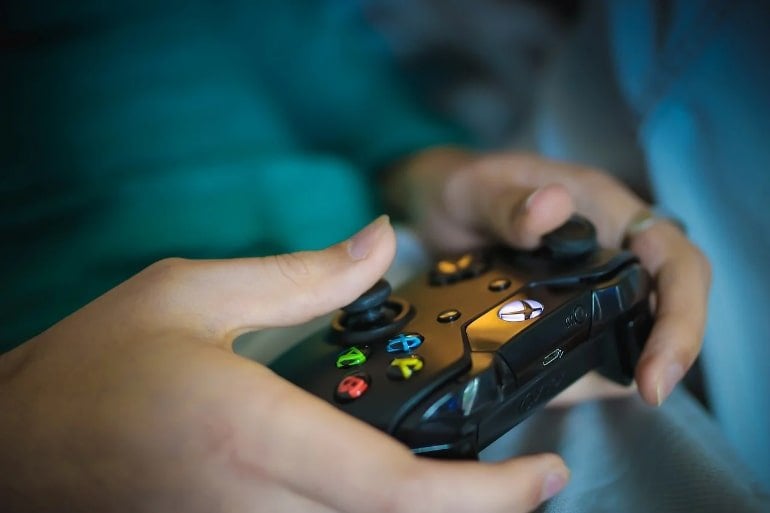Summary: Video game players are faster and more accurate in their responses, and excel at decision-making tasks. The differences in accuracy and reaction time correlated with enhanced brain activity.
Source: Georgia State University
Frequent players of video games show superior sensorimotor decision-making skills and enhanced activity in key regions of the brain as compared to non-players, according to a recent study by Georgia State University researchers.
The authors, who used functional magnetic resonance imaging (FMRI) in the study, said the findings suggest that video games could be a useful tool for training in perceptual decision-making.
“Video games are played by the overwhelming majority of our youth more than three hours every week, but the beneficial effects on decision-making abilities and the brain are not exactly known,” said lead researcher Mukesh Dhamala, associate professor in Georgia State’s Department of Physics and Astronomy and the university’s Neuroscience Institute.
“Our work provides some answers on that,” Dhamala said. “Video game playing can effectively be used for training — for example, decision-making efficiency training and therapeutic interventions — once the relevant brain networks are identified.”
Dhamala was the adviser for Tim Jordan, the lead author of the paper, who offered a personal example of how such research could inform the use of video games for training the brain.
Jordan, who received a Ph.D. in physics and astronomy from Georgia State in 2021, had weak vision in one eye as a child. As part of a research study when he was about 5, he was asked to cover his good eye and play video games as a way to strengthen the vision in the weak one.
Jordan credits video game training with helping him go from legally blind in one eye to building strong capacity for visual processing, allowing him to eventually play lacrosse and paintball. He is now a postdoctoral researcher at UCLA.
The Georgia State research project involved 47 college-age participants, with 28 categorized as regular video game players and 19 as non-players.
The subjects laid inside an FMRI machine with a mirror that allowed them to see a cue immediately followed by a display of moving dots. Participants were asked to press a button in their right or left hand to indicate the direction the dots were moving, or resist pressing either button if there was no directional movement.

The study found that video game players were faster and more accurate with their responses.
Analysis of the resulting brain scans found that the differences were correlated with enhanced activity in certain parts of the brain.
“These results indicate that video game playing potentially enhances several of the subprocesses for sensation, perception and mapping to action to improve decision-making skills,” the authors wrote.
“These findings begin to illuminate how video game playing alters the brain in order to improve task performance and their potential implications for increasing task-specific activity.”
The study also notes there was no trade-off between speed and accuracy of response — the video game players were better on both measures.
“This lack of speed-accuracy trade-off would indicate video game playing as a good candidate for cognitive training as it pertains to decision-making,” the authors wrote.
About this gaming and neuroscience research news
Author: Anna Varela
Source: Georgia State University
Contact: Anna Varela – Georgia State University
Image: The image is in the public domain
Original Research: Open access.
“Video game players have improved decision-making abilities and enhanced brain activities” by Tim Jordan et al. NeuroImage
Abstract
Video game players have improved decision-making abilities and enhanced brain activities
Video game playing is a popular activity which provides a cognitively engaging, sensory rich environment that can lead to cognitive benefits in those who play frequently. How exactly they change our brain to achieve these cognitive benefits has yet to be known.
In a functional magnetic resonance imaging (fMRI) experiment, we examined the behavioral and brain responses of video game- players (VGP) and non-video game-players (NVGP) during decision-making tasks. In behavioral response, VGP were overall faster by approximately 190 ms and more accurate by 2% than NVGP.
In brain response, comparing percent signal changes in commonly activated brain regions between groups, we found that video gamers had increased task-related signal changes in the right lingual gyrus, right supplementary motor area (SMA), and left thalamus associated with improved behavioral response. Directed functional network activities to the right SMA and the left thalamus were also increased.
The regional signal changes and network activities of all participants were found to be negatively correlated with decision response time, indicating that higher the node and network activities better the performance.
These results provide novel insights into the brain mechanisms that underlie improvements in sensorimotor decision-making abilities due to video game playing.






